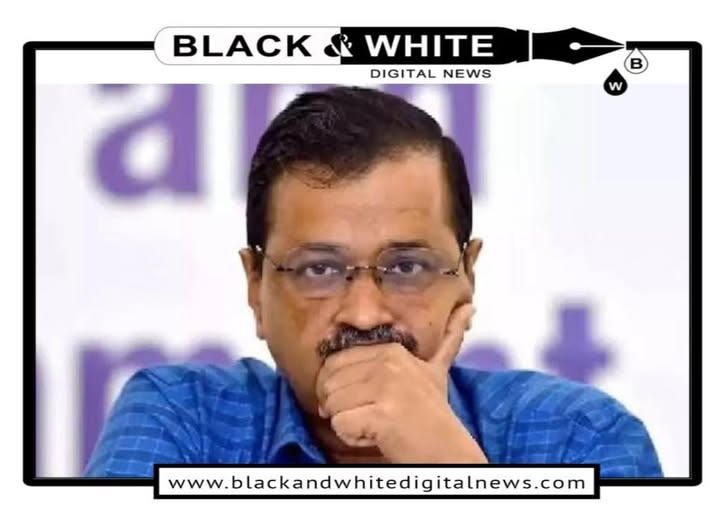Arvind Kejriwal Suffers Defeat in Delhi Assembly Elections.
The Rise and Fall of Arvind Kejriwal: From Anti-Corruption Crusader to Embattled Politician
||Black and White Digital News||
||Tejveer Singh February 08, 2025||
New Delhi :In a significant political shift, Arvind Kejriwal, the leader of the Aam Aadmi Party (AAP), has been defeated in the New Delhi assembly constituency by Bharatiya Janata Party (BJP) candidate Parvesh Verma. This loss marks a dramatic turn for Kejriwal, who had previously held the seat since 2013.
The Delhi Assembly elections, held on February 5, 2025, witnessed a voter turnout of approximately 58%, with over 1.5 million residents casting their ballots across 13,766 polling stations. Early trends indicated a tight race in the New Delhi constituency, but as counting progressed, Verma secured a decisive victory over Kejriwal.
Several elements contributed to Kejriwal’s electoral setback:
1. Corruption Allegations: In March 2024, Kejriwal was arrested by the Enforcement Directorate on charges related to the Delhi government’s liquor policy, leading to a six-month incarceration. Although he was released on bail, the incident significantly tarnished his anti-corruption image.
2. Anti-Incumbency Sentiment: After a decade in power, AAP faced growing public dissatisfaction. Critics pointed to unmet promises and administrative challenges, which eroded the party’s support base.
3. Strong Opposition Candidates: Both the BJP and Congress fielded formidable candidates against Kejriwal. Parvesh Verma, son of former Delhi Chief Minister Sahib Singh Verma, leveraged his political lineage and local appeal to garner support. Similarly, Congress’s Sandeep Dikshit, son of former Chief Minister Sheila Dikshit, added to the competitive landscape.
Reactions and Implications:
Social activist Anna Hazare, once a mentor to Kejriwal during the India Against Corruption movement, attributed AAP’s defeat to the leadership’s involvement in controversies related to liquor and financial misconduct. He remarked that such actions led to the party’s downfall.
Kejriwal first garnered national attention in 2011 as a pivotal figure in the India Against Corruption (IAC) movement, led by veteran activist Anna Hazare. This movement, advocating for the Jan Lokpal Bill—a stringent anti-corruption legislation—resonated deeply with a populace weary of systemic graft. Capitalizing on this momentum, Kejriwal founded the Aam Aadmi Party (AAP) in 2012, positioning it as a beacon of transparency and accountability.
In the 2013 Delhi Legislative Assembly elections, AAP made a remarkable debut, securing 28 out of 70 seats. Kejriwal assumed the role of Chief Minister, albeit for a brief tenure of 49 days, resigning in February 2014 over a contentious anti-corruption bill. Undeterred, he returned to power in 2015 with a landslide victory, winning 62 of the 70 seats, reaffirming his mandate in 2020 with an identical tally.
Despite these electoral successes, Kejriwal’s tenure has been marred by controversies that have progressively eroded his reformist image. A series of defamation lawsuits saw him tender apologies to political adversaries, including Nitin Gadkari, Kapil Sibal, and Bikram Majithia, raising questions about the veracity of his earlier allegations.
The most significant blow came with the so-called “Delhi liquor scam.” In March 2024, Kejriwal was arrested by the Enforcement Directorate on allegations of corruption related to the Delhi government’s liquor policy, making him the first sitting Chief Minister in India to be incarcerated. He was granted bail after nearly six months, but the damage to his reputation was profound.
These legal entanglements coincided with electoral setbacks. In the recent Delhi state elections, the Bharatiya Janata Party (BJP) capitalized on the AAP’s tarnished image, leading to significant losses for Kejriwal’s party. Veteran activist Anna Hazare attributed these defeats to the AAP leadership’s involvement in controversies related to liquor and money, suggesting a departure from the party’s foundational principles.
Various media outlets have chronicled Kejriwal’s tumultuous journey. The Economic Times highlighted the irony of his transformation from an anti-corruption crusader to an accused in a scam, noting the full-circle trajectory of his political odyssey. The Guardian reported on his arrest and subsequent bail, emphasizing the political ramifications and the allegations of these charges being politically motivated.
This electoral outcome signifies a resurgence for the BJP in Delhi, a region where it had not secured power for over two decades. The party’s victory is seen as a testament to its strategic campaigning and ability to capitalize on AAP’s vulnerabilities.
With the election results reshaping Delhi’s political landscape, the focus now shifts to the formation of the new government and its policy directions. For Kejriwal and AAP, this defeat presents an opportunity for introspection and recalibration as they navigate the challenges ahead.



